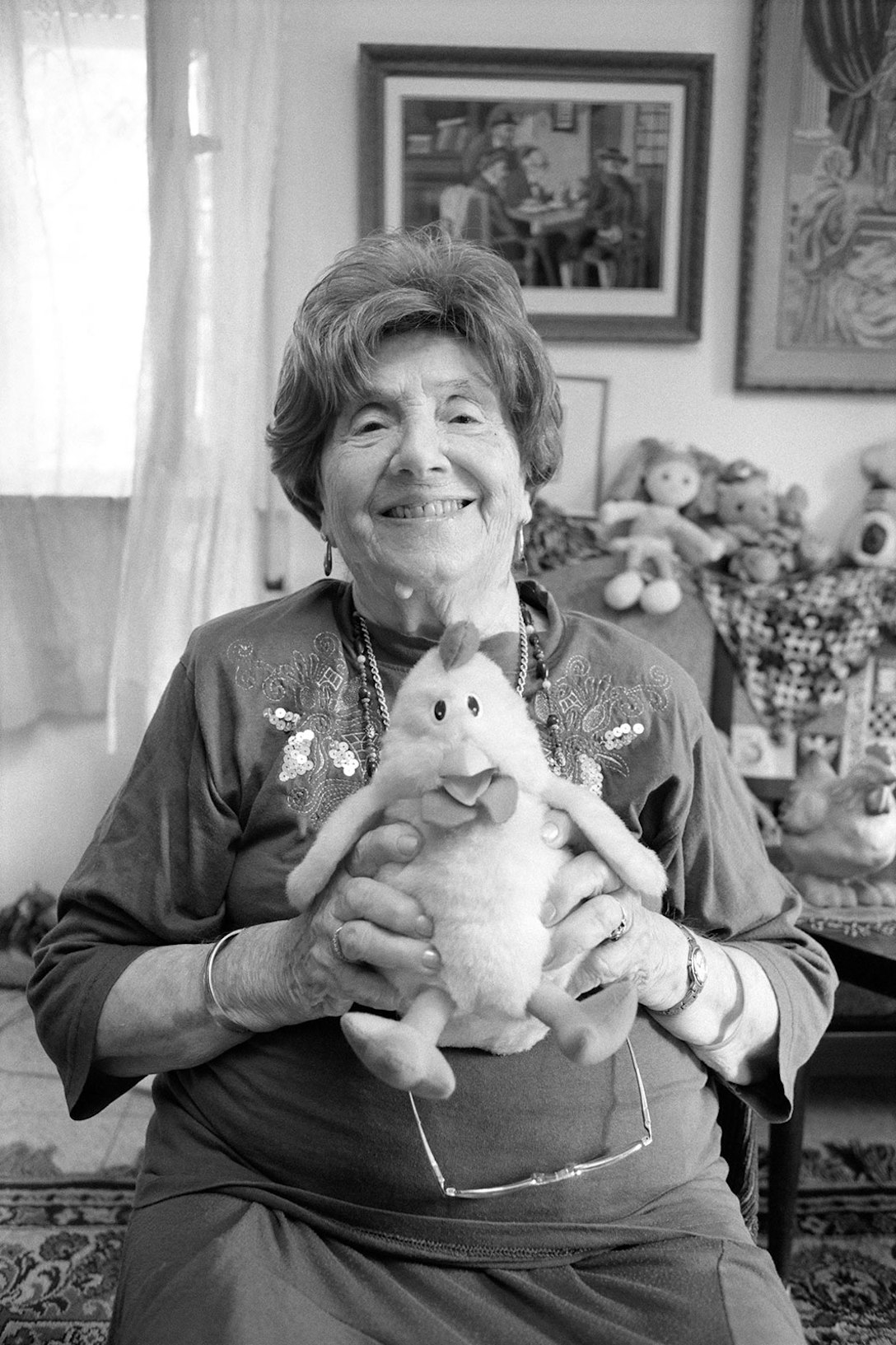
Clara Hammer
Jerusalem, Israel
PROFOUND GENEROSITY: THE CHICKEN LADY OF JERUSALEM
I was at the butcher and three young girls were standing in front of me. And each time that a girl came [to the counter] he disappeared into the [back] room. It took him time to return. When he did, he handed her a big bag of what I saw was bones, fat, and skin. And the girl took it and bowed and bowed—[saying] ‘toda toda toda’— and she walked out.
When it was my turn, I said, ‘Mr. Hacker, how many cats and dogs does that family have that you give them that trash, that junk?’
He said, ‘No, Ms. Hammer, they don’t have cats and they don’t have dogs. The father is very sick; dialysis. They are in trouble and they owe me a lot of money. I can’t give [to] them anymore. So, I save bones, the fats; some people don’t like certain parts, so I save it and give it to them free.’
I said to him, ‘Mr. Hacker, from today on, you do not give them that trash, that junk. Throw it to the cats and dogs. You give them whatever they want, according to the size of the family. Keep a record and I, Clara Hammer, will pay for it.’
‘Really? Really? Really?’ He kept touching his beard all the time when he said it.
I said, ‘Yes. Really, really, really.’
As of today, I have 150 families that come to Hacker. They get whatever they want. He marks it down, keeps a record, and once a month, at the beginning of the month, every beginning of the month, I come in, I get a bill, and I pay him. And so far, thank God almighty, I pay my bills on time. Because people trust me, and I trust Him. People have what to eat and I don’t have to worry that I owe people money. Thank God.
And some, they gave me a name: Clara Hammer, ‘The Chicken Lady.’ And it’s written up in the newspapers! In Hebrew and in English. What does it mean? Well, we had the Holy Temple in Jerusalem. We had the Holy Ark. Inside was whatever they had in those days. A jar, a bottle, a container of special oil. And the high priest, before he went out to bless the people, he used to come in, and the other priests that were there used to take some of the oil and put it on his head three times and then put on his—whatever they used to wear in the old days—and it was called ‘good oil.’ So we say, ‘a good name is better than good oil.’ And that’s why I have a good name: Clara Chaya Hammer. Thank God people trust me with thousands of dollars that I paid the butcher. I pay Hacker thousands of shekels. And I always pray to Hashem that as long as it is written I’m gonna live. I should be well and carry on this that helps a lot of people. And it helps me to feel good that I do something good. ‘There she goes, The Chicken Lady!’ OK! I’m ‘The Chicken Lady!’
Daniel’s Reflection
The memory of meeting Clara is important to me now as I reflect on the lessons of the COVID-19 pandemic circling the globe since early 2020.
There is no better person to exemplify this lesson than Clara Hammer (may her memory be for a blessing). I met Clara Hammer in Jerusalem where she was affectionately known as “The Chicken Lady.” By the time I met and interviewed her in Jerusalem, she was providing food to 150 families each week. She often did not know the family names and who specifically she was helping. As time went on, she collected money from others who wanted to support her effort.
There are many questions I have when I think about Clara Hammer’s generosity.
In what way is charity an obligation?
Are some forms of charity more noble or helpful than others?
Why is feeding others so important? When and where must I feed others?
If food becomes very scarce, am I obligated to feed others before my family and myself?
What are the “bones and fat” we leave for others?
What does profound generosity look like right here, right now?
Tending to the needs of those less fortunate is a big part of all religions. The closest word for “charity” in Hebrew is tzedakah which actually means “ justice.” The lesson as explained by Richard Schwartz in an article titled, “Issues in Jewish Ethics” in the Jewish Virtual Library is: “In the Jewish tradition, tzedakah is not an act of condescension from one person to another who is in need. It is the fulfillment of a mitzvah, a commandment, to a fellow human being, who has equal status before God. Although Jewish tradition recognizes that the sharing of our resources is also an act of love – as the Torah states, ‘Love thy neighbor as thyself’ (Lev.19:18), it emphasizes that this act of sharing is an act of justice. This is to teach us that people who are in need are entitled to our love and concern. They too are human beings created in the Divine image; they too have a place and a purpose within God’s creation.
“In the Jewish tradition, failure to give charity is equivalent to idolatry. This may be because a selfish person forgets the One Who made us all, and in becoming preoccupied with personal material needs makes himself or herself into an idol.”
Judaism also provides principles for giving that can guide us in feeding others. This guidance comes from the famous rabbi/scholar, Maimonides, who lived in Medieval Spain. He listed Eight Levels of Giving in the Mishneh Torah—each one greater than the other—starting from the most righteous to the least righteous:
Giving an interest-free loan to a person in need; forming a partnership with a person in need; giving a grant to a person in need; finding a job for a person in need, so long as that loan, grant, partnership, or job results in the person no longer living by relying upon others.
Giving tzedakah anonymously to an unknown recipient via a person or public fund.
Giving tzedakah anonymously to a known recipient.
Giving tzedakah publicly to an unknown recipient.
Giving tzedakah before being asked.
Giving adequately after being asked.
Giving willingly, but inadequately.
Giving “in sadness” (giving out of pity): It is thought that Maimonides was referring to giving because of the sad feelings one might have in seeing people in need (as opposed to giving because it is a religious obligation). Other translations say, “Giving unwillingly.”
So, if we apply this to feeding the hungry, the most righteous thing we can do is help someone feed themselves and their family through a job or a garden/farm or other ways of providing for themselves. What Clara Hammer did so nobly is considered in Maimonides’ fourth level: giving willingly and publicly to unknown recipients before being asked. Clara Hammer achieved so much good in her life through the simple act of feeding others.
Feeding the hungry is among the greatest mitzvot (commandments) and ways of giving tzedakah. One reason is that the concept of saving a life (pikuach nefesh) is considered the most holy act and supersedes all other commandments, such as keeping kosher, or keeping the Sabbath.
Feeding the hungry is so important that the commentaries to Psalms in the Midrash Tehillim say it is the “ticket” to getting into heaven: “When you are asked in the world to come, ‘What was your work?’ and you answer, ‘I fed the hungry,’ you will be told, ‘This is the gate of Adonai, enter into it, you who have fed the hungry.’”
Interestingly, the Jewish tradition (according to the Mishneh Torah 6:6) also says that it is not our job to determine if the person presenting themselves is really hungry and without food: “If a stranger comes and says, ‘I am hungry. Please give me food,’ we are not allowed to check to see if he is honest or not; we must immediately give him food.”
Looking outside of Judaism, even in the famous story (from Polishing the Mirror: How to Live from Your Spiritual Heart) of when Mahara-jii (Neem Karoli Baba) tells Ram Dass (Richard Alpert) to return to America from India, Ram Dass asks him how he can achieve enlightenment: “I kept hoping to get esoteric teachings from Maharaji, but when I asked, ‘How can I become enlightened?’ he said things like, ‘Love everybody, serve everybody, and remember God,’ or ‘Feed people.’”
So, what Ram Dass took away was that the path to enlightenment was: “help people, feed people.”
I’ve come to understand there is nothing so holy as feeding others in need. We know there are food insecure families even in our back yard here in the developed world. This COVID-19 pandemic has created food shortages, especially among those who did not go out to buy and hoard food. As I write this, supermarket shelves are bare. Will we be ready to feed others as our period of quarantine lengthens?
On the website, “My Jewish Learning,” I found an explanation that helped me understand my responsibility to members of my community who suffer poverty. One principle is that my give can be measured by consideration of how these people lived their lives prior to their time of lack. A once- wealthy person who now suffers lack is entitled to receive money or support to match what they had in the past, within reason. Another principle is that one’s own livelihood must be assured before giving to others, but that even those who receive tzedakah must also give it to those less fortunate.
I’ve come to see that feeding others is about learning to have a generous heart. There have been times in my life when I was selfish and worried about whether I would have enough. I see now that a scarcity mindset is inconsistent with spiritual growth. Author Sharon Salzberg, in Lovingkindness: The Revolutionary Art of Happiness, wrote about how Buddha gave instruction regarding generosity. He said that a spiritual life is not possible without giving to others.
There are times in my life when I am bringing just the “bones, fat, and skin” to others, including those in need. During this time of COVID-19, I pray to be less stingy and less concerned and to be proactive to helping others. I started calling others to see if I could get them groceries or pick up medicines from the pharmacy. Or help with childcare. Or organize online meetings for groups of friends who would otherwise remain isolated. This story of Clara Hammer reminds me to step up to the need at hand, whatever that is. Christians observe Lent where sacrifice models Jesus’s sacrifice. Jews observe Passover where we are commanded to “let all who are hungry come and eat.”
I am writing this reflection with the intention to search out others in need, especially those who are food insecure during this COVID-19 crisis and thereafter. I know that I will have plenty to share because of the great Christian saying attributed to Jan Greenwood: “Where God gives the vision, He gives the provision!”
I asked my dear friend, teacher, and tzedakah worker, Arnie Draiman, who introduced me to Clara Hammer, what he felt were the most important lessons from her life. Arnie shared two profound lessons: “Giving tzedakah is the antidote to the evil and unsurety in the world. It is an act that connects you intimately with others. It is holy and should be revered as such.
“That anyone, at any age, can do good, can create something that wasn’t there yesterday. Doing good has no age limits, upper or lower!”
Let us all be like Clara Hammer. Let us feed people and be profoundly generous.
Note: Arnie Draiman is a philanthropic consultant helping people, philanthropists, and foundations from around the world give their tzedakah money away wisely, efficiently, and effectively. He has worked in this field for more than 25 years. Arnie was the advisor for my youth group in 1980-81 and became a dear friend in the years since then. He connects people who want to make a difference with their tzedakah dollars to amazing people like Clara Hammer. He can be reached at ajdraiman@gmail.com.
Permissions and References
-
Jewish Virtual Library, A Project of American-Israeli Cooperative Enterprise (AICE).
-
Schwartz, Richard, Ph.D., “Issues in Jewish Ethics: The Jewish Response to Hunger.”
Permission to quote text from Jewish Virtual Library was given to the author by Richard Schwartz, Ph.D. on June 25, 2021.
-
Maimonides. “Eight Levels of Giving.” Mishneh Torah, “Gifts to the Poor,” Chapter 10:7-14.
-
Midrash Tehillim, Psalms 118:17.
-
Mishnah Torah 6:6.
-
Dass, Ram. Reprint 2013. Polishing the Mirror: How to Live from Your Spiritual Heart. Sounds True;
Permission to quote from this book was given to the author by Raghu Markus on July 5, 2021.
-
Salzberg, Sharon. 2020. Lovingkindness: The Revolutionary Art of Happiness. Shambhala.
Explore the portraits by theme
- happiness
- grief
- addiction
- sexuality
- sobriety
- transgender
- alcoholism
- suicide
- homelessness
- death
- aggression
- cancer
- health
- discipline
- abortion
- homosexuality
- recovery
- connection
- enlightenment
- indigenous
- depression
- meditation
- therapy
- anger
- forgiveness
- Doubt
- interfaith
- worship
- salvation
- healing
- luminaries

